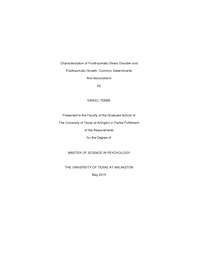| dc.contributor.author | Tebbe, Daniel | en_US |
| dc.date.accessioned | 2015-07-31T22:10:22Z | |
| dc.date.available | 2015-07-31T22:10:22Z | |
| dc.date.submitted | January 2015 | en_US |
| dc.identifier.other | DISS-13208 | en_US |
| dc.identifier.uri | http://hdl.handle.net/10106/25135 | |
| dc.description.abstract | The current study sought to examine common determinants of posttraumatic stress posttraumatic growth. Specifically, it sought to determine whether common factors may differentially predict PTS and PTG. A longitudinal examination of lung cancer patients was utilized, consisting of three time points. The factors examined included both stable (unmodifiable) and amenable predictors. It was found that while the stable predictors did not significantly predict either PTS or PTG, two of the amenable predictors did differentially predict PTS and PTG. These were the quality of one's primary source of social support and patients' cognitive appraisal of their illness. Specifically, the better the quality of one's primary social support the more likely they were to develop PTG, and the worse the quality of support the more likely they were to develop PTS. Also, greater cognitive appraisal of challenge resulted in greater development of PTG, while higher appraisal of harm/threat resulted in higher development of PTS. | en_US |
| dc.description.sponsorship | Liegey-Dougall, Angela | en_US |
| dc.language.iso | en | en_US |
| dc.publisher | Psychology | en_US |
| dc.title | Characterization Of Posttraumatic Stress Disorder And Posttraumatic Growth: Common Determinants And Associations | en_US |
| dc.type | M.S. | en_US |
| dc.contributor.committeeChair | Liegey-Dougall, Angela | en_US |
| dc.degree.department | Psychology | en_US |
| dc.degree.discipline | Psychology | en_US |
| dc.degree.grantor | University of Texas at Arlington | en_US |
| dc.degree.level | masters | en_US |
| dc.degree.name | M.S. | en_US |

